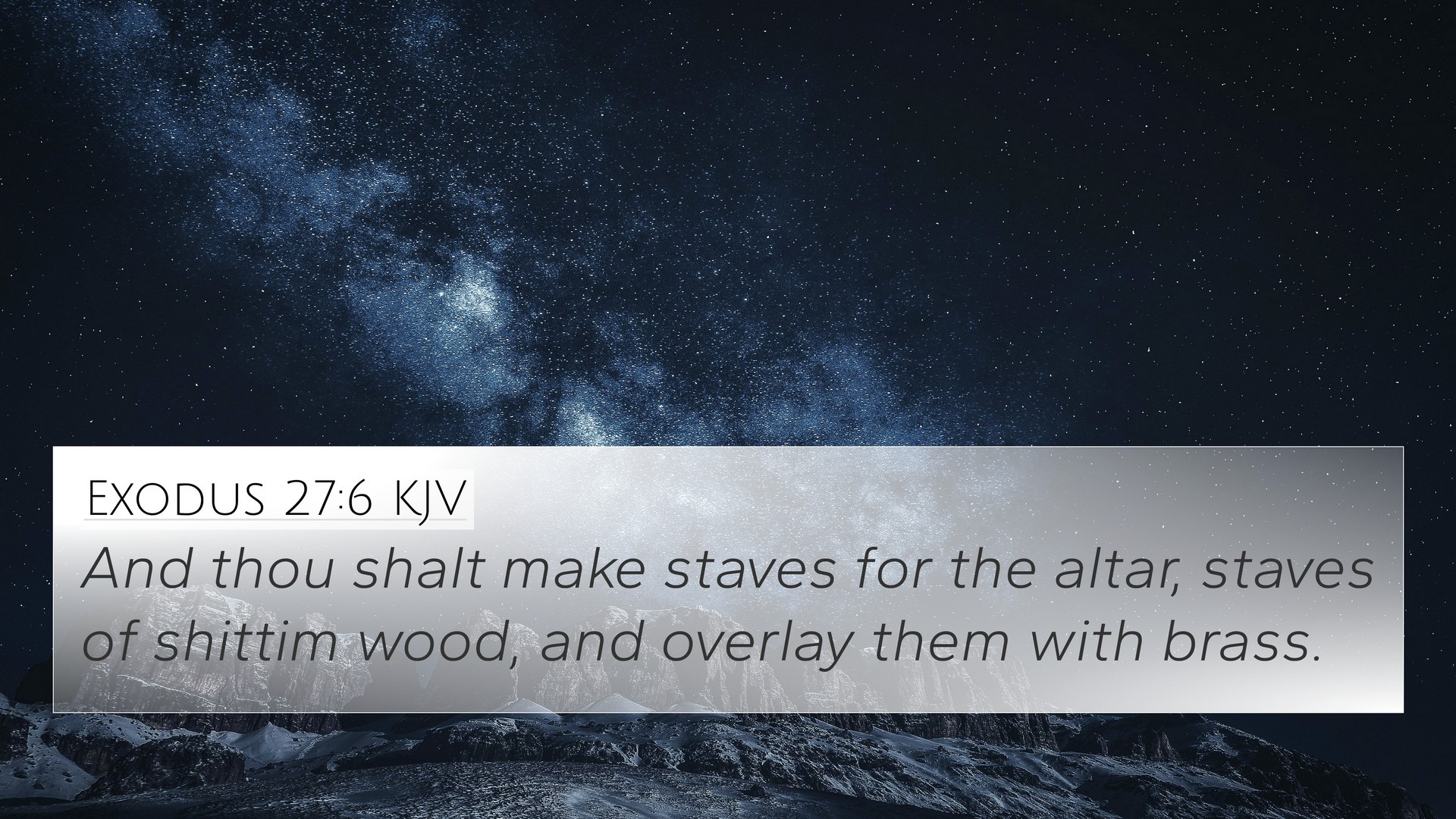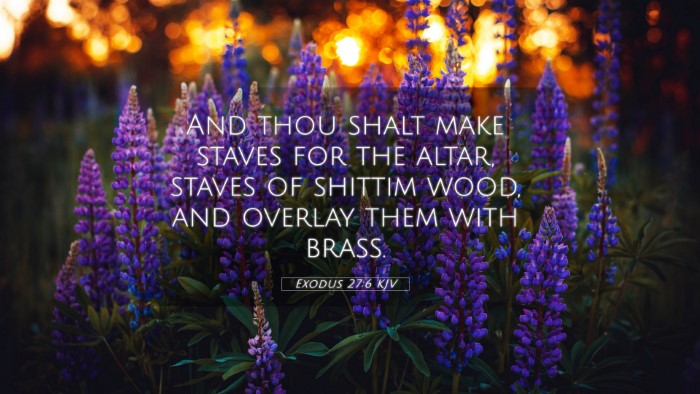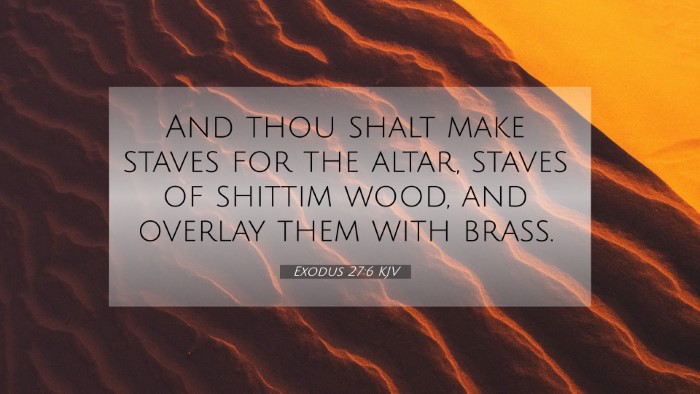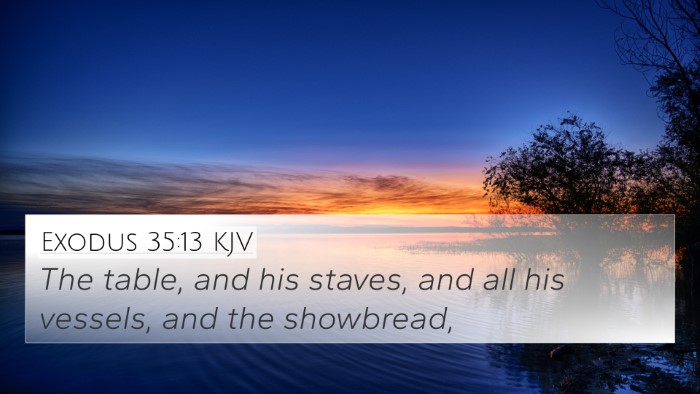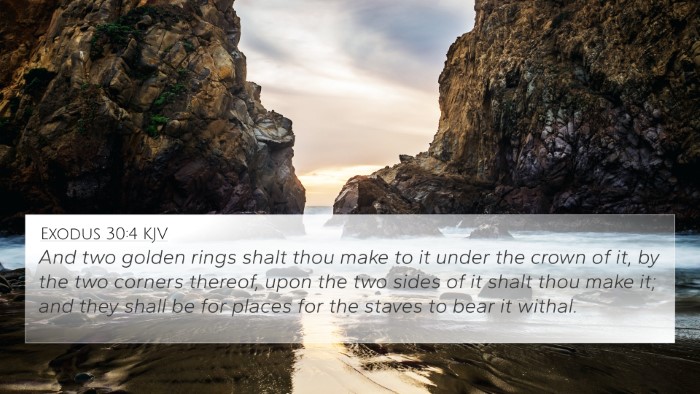Bible Verse Meaning: Exodus 27:6
Exodus 27:6 states, "And you shall make poles for the altar, poles of acacia wood, and overlay them with bronze." This verse is part of God's detailed instructions for the construction of the altar for burnt offerings in the Tabernacle. To understand the significance of this verse, we draw insights from prominent public domain commentaries like those of Matthew Henry, Albert Barnes, and Adam Clarke.
Summary of Insights
This verse emphasizes two critical elements in the worship of God: the materials for the altar and the functionality of the altar in sacred rituals.
Materials of the Altar
According to Matthew Henry, the choice of acacia wood and bronze symbolizes both durability and value. Acacia wood, which is resistant to decay, represents the enduring nature of God's presence. Bronze, often associated with judgment and purification, signifies the seriousness of offerings made to God. The use of high-quality materials reflects the honor due to the divine and signifies the importance of maintaining purity in worship.
Construction and Mobility
Albert Barnes notes the importance of poles in the transport of the altar. This feature highlights God’s provision for a mobile place of worship among His people. The altar had to be easily moved as the Israelites traveled through the wilderness, reminding them of God's constant presence and the need for continual sacrifices. The poles signify readiness and accessibility; the worshippers must be prepared to approach God anytime the altar is set up.
Theological Significance
Adam Clarke elaborates on the altar’s functionality as the place for atonement. It was crucial for the Israelites to have a designated place for sacrifices, which served as a physical representation of their relationship with God. The mobility of the altar indicates that God’s presence is not confined and that He travels with His people, constantly inviting them into a space of sacrifice and reconciliation.
Cross-References for Deeper Understanding
To enrich our understanding of Exodus 27:6, we can reference several related Bible verses that highlight similar themes:
- Exodus 40:6-7: Instructions for the placement of the altar in the Tabernacle.
- Leviticus 1:5: The process of offering sacrifices at the altar, enhancing the understanding of its purpose.
- Hebrews 9:13-14: Illustrates the sacrificial system in light of Christ’s ultimate sacrifice.
- 1 Corinthians 3:12: Discusses building upon the foundation with precious materials, analogous to the altar's materials.
- Psalm 51:17: Emphasizes God desiring a broken spirit, tying into the motivation behind sacrifices at the altar.
- Isaiah 56:7: Further establishes the altar's significance as a house of prayer, broader than mere sacrifices.
- Romans 12:1: Calls for believers to offer themselves as living sacrifices, reflecting the essence of the Old Testament altar.
Thematic Connections
The thematic connections found within these verses highlight the continuity of God’s redemptive plan from the Old Testament to the New Testament. The altar in Exodus serves as a precursor to Christ’s ultimate sacrifice, embodying the necessity of sacrificial atonement for sin.
Tools for Bible Cross-Referencing
Understanding the connections between these Bible verses can be enhanced with various tools for Bible cross-referencing. Utilizing a Bible concordance or Bible cross-reference guide can facilitate a deeper exploration of themes, revealing the rich inter-Biblical dialogue on worship, sacrifice, and God’s presence.
Conclusion
In conclusion, Exodus 27:6 serves not only as an instruction for building the altar but also as a profound reminder of God’s holiness, the need for sacrifice, and the essence of worship. By cross-referencing this verse with others, we deepen our understanding of the importance of sacrifices in the life of the believer and the anticipation of Christ’s atoning work.
